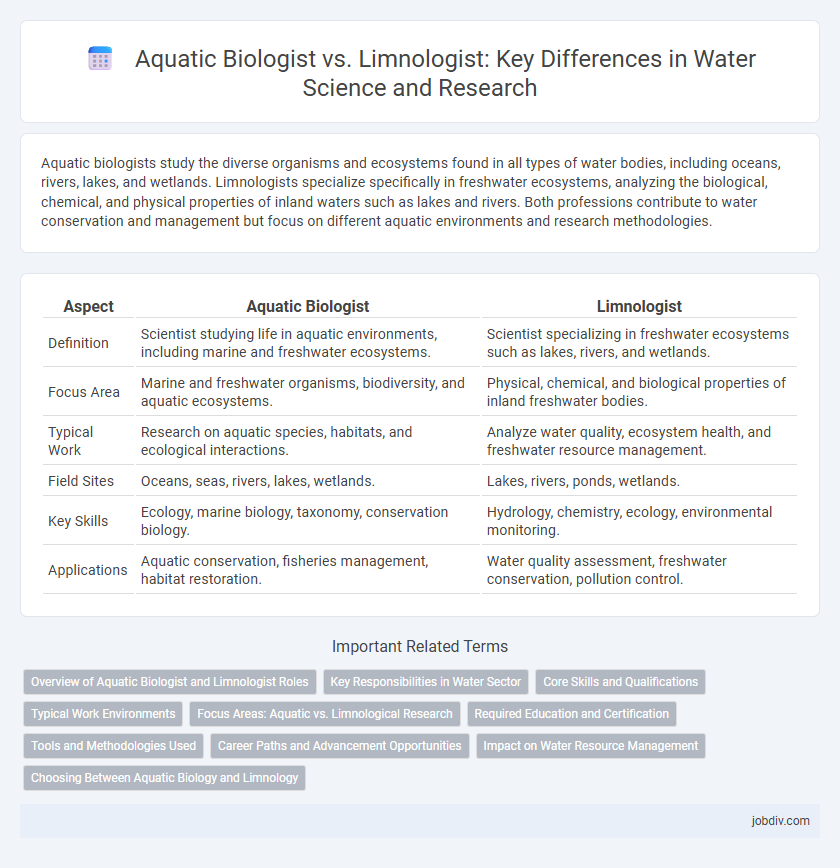Aquatic biologists study the diverse organisms and ecosystems found in all types of water bodies, including oceans, rivers, lakes, and wetlands. Limnologists specialize specifically in freshwater ecosystems, analyzing the biological, chemical, and physical properties of inland waters such as lakes and rivers. Both professions contribute to water conservation and management but focus on different aquatic environments and research methodologies.
Table of Comparison
| Aspect | Aquatic Biologist | Limnologist |
|---|---|---|
| Definition | Scientist studying life in aquatic environments, including marine and freshwater ecosystems. | Scientist specializing in freshwater ecosystems such as lakes, rivers, and wetlands. |
| Focus Area | Marine and freshwater organisms, biodiversity, and aquatic ecosystems. | Physical, chemical, and biological properties of inland freshwater bodies. |
| Typical Work | Research on aquatic species, habitats, and ecological interactions. | Analyze water quality, ecosystem health, and freshwater resource management. |
| Field Sites | Oceans, seas, rivers, lakes, wetlands. | Lakes, rivers, ponds, wetlands. |
| Key Skills | Ecology, marine biology, taxonomy, conservation biology. | Hydrology, chemistry, ecology, environmental monitoring. |
| Applications | Aquatic conservation, fisheries management, habitat restoration. | Water quality assessment, freshwater conservation, pollution control. |
Overview of Aquatic Biologist and Limnologist Roles
Aquatic biologists study various organisms and ecosystems in both freshwater and marine environments, focusing on biodiversity, behavior, and ecological interactions. Limnologists specialize in the scientific study of inland waters such as lakes, rivers, and wetlands, analyzing physical, chemical, and biological properties to assess ecosystem health. Both roles contribute to water resource management and conservation but differ in scope, with aquatic biologists covering broader aquatic habitats and limnologists concentrating specifically on freshwater systems.
Key Responsibilities in Water Sector
Aquatic biologists study the behavior, physiology, and ecology of marine and freshwater organisms, emphasizing ecosystem health and biodiversity conservation within oceans, rivers, and lakes. Limnologists specialize in the physical, chemical, and biological properties of freshwater bodies, focusing on water quality assessment, pollution control, and habitat restoration in lakes, ponds, and reservoirs. Both professionals play critical roles in monitoring aquatic environments, influencing water resource management, and supporting sustainable practices in the water sector.
Core Skills and Qualifications
Aquatic biologists specialize in studying marine and freshwater organisms, requiring expertise in marine biology, ecology, and species identification, along with skills in field sampling and laboratory analysis techniques. Limnologists focus on inland water bodies such as lakes and rivers, emphasizing qualifications in freshwater ecology, hydrology, and water chemistry, with strong abilities in water quality assessment and ecosystem modeling. Both professions demand proficiency in data collection, environmental monitoring, and the use of geographic information systems (GIS) for habitat mapping.
Typical Work Environments
Aquatic biologists typically work in diverse environments including oceans, rivers, lakes, and wetlands to study marine and freshwater ecosystems. Limnologists primarily focus on freshwater habitats such as lakes, ponds, and reservoirs, conducting research on water quality, aquatic organisms, and ecological dynamics. Both professions may work in field sites, research laboratories, and environmental consulting firms, but limnologists are more specialized in inland freshwater systems.
Focus Areas: Aquatic vs. Limnological Research
Aquatic biologists study diverse aquatic ecosystems, including marine, freshwater, and estuarine environments, focusing on the biological and ecological interactions within these habitats. Limnologists specialize in freshwater systems such as lakes, rivers, and wetlands, examining physical, chemical, and biological processes specific to inland waters. Both fields employ interdisciplinary methods but diverge in scope, with aquatic biology encompassing broader aquatic environments and limnology concentrating on freshwater research.
Required Education and Certification
Aquatic biologists typically require a bachelor's degree in biology, ecology, or environmental science, with many positions favoring advanced degrees such as a master's or Ph.D. Limnologists often pursue specialized education in freshwater systems, commonly holding degrees in limnology, hydrology, or environmental science, with certification through organizations like the American Water Resources Association enhancing career prospects. Both fields benefit from professional certifications such as Certified Ecologist (CE) or Professional Wetland Scientist (PWS), which validate expertise in aquatic ecosystems and freshwater research.
Tools and Methodologies Used
Aquatic biologists employ tools such as underwater cameras, sonar, and scuba gear to study marine ecosystems, focusing on oceanic species and habitats. Limnologists utilize specialized equipment like water quality sensors, sediment corers, and phytoplankton nets to analyze freshwater bodies, including lakes and rivers. Both disciplines rely on laboratory techniques such as chemical analysis and ecological modeling to assess aquatic health and biodiversity.
Career Paths and Advancement Opportunities
Aquatic biologists and limnologists both study freshwater ecosystems, yet aquatic biologists often specialize broadly in marine and freshwater environments, offering diverse career paths in environmental consulting, research institutions, and conservation agencies. Limnologists focus specifically on inland water bodies such as lakes, rivers, and wetlands, resulting in advancement opportunities within governmental environmental departments, water resource management, and academic research. Career growth in both fields depends on expertise in water quality analysis, ecosystem monitoring, and advanced degrees in environmental science, biology, or ecology.
Impact on Water Resource Management
Aquatic biologists and limnologists both play crucial roles in water resource management by assessing and preserving freshwater ecosystems. Aquatic biologists study the interactions between organisms and their aquatic environments, providing vital insights for habitat restoration and biodiversity conservation. Limnologists specialize in the physical, chemical, and biological properties of inland waters, enabling effective monitoring and management of lakes, rivers, and wetlands to maintain water quality and ecosystem health.
Choosing Between Aquatic Biology and Limnology
Choosing between aquatic biology and limnology depends on specific research interests and environmental focus. Aquatic biology broadly studies all water bodies including oceans, rivers, and lakes, emphasizing biological processes and organism interactions. Limnology specializes in the study of inland freshwater ecosystems, focusing on physical, chemical, and biological properties unique to lakes, rivers, and wetlands.
Aquatic Biologist vs Limnologist Infographic

 jobdiv.com
jobdiv.com